nycBigCityLit.com the rivers of it, abridged


Articles
Fall 2011
Zuccotti Journal: Search and Witness
by Richard Levine
September 28, 'What's Goin' On?'
September 28 is my first visit to Zuccotti Park and the Occupy Wall Street (OWS) movement. I'm going to see and ask, a la Marvin Gaye, "What's Goin' On?" The movement is two weeks old already and there is virtually no coverage of it in the news, but for one story I watch the night before on Keith Olbermann's Countdown on Current TV. So I'm going to see for myself.
If given only one word to describe what I see today it would be fledgling or nascent. Other words that come readily to mind include alert, alive!, brave, cooperative, hopeful, impressive, listening, optimistic, organized, responsive, searching, and visionary. This clearly is a movement still in molt, and the figurative feather-shedding and scruffiness are everywhere to be seen, but no less so than the evidence that this is a bird 'bound for glory' and history.
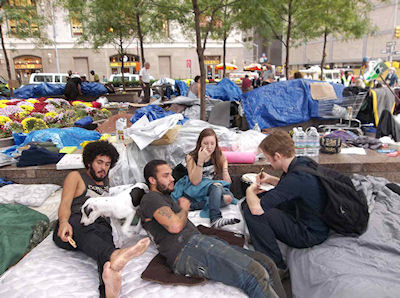
There are still only a few tents in Zuccotti, the weather still warm and these pioneering Occupiers able and preferring to 'sleep out under the stars', on mattresses. But there are many signs of exploration, including hundreds of literal cardboard signs laid out on the ground, ready to pick up for the next march. Collectively, the slogans on those signs begin to establish identity (We are the 99%) and purpose, and will 'broadcast' wherever OWS marches. In concise phrases the posters also seek redress from the malfeasance of bankers (Bank of America, Bank of Coal) and Wall Street (The People Are Too Big to Fail), the abusive power of corporations (I'll believe corporations are people when Rick Perry executes one), from the burdens of student loans (Student loan debt is not dischargeable in bankruptcy, but gambling debt is!), the plight of veterans (15-20% jobless, 150,000-200,000 homeless), philosophy (You Cannot Evict An Idea), and unlikely appeals for solidarity (NYPD is one layoff away from joining us).
The posters are being made by several Occupiers, on hands and knees with markers, brushes and paints. This is one of several 'stations' (that's my word, I don't know what they call them). There are also stations for food, medical attention, clothing, media, and even meditation, and many Occupiers on the street around the park meeting and greetings passersby with the gospel of We Are The 99%. Despite the ragtag aspects of their encampment, what is most apparent to me is an underlying sense of order: there is a plan here and everyone seems be onboard with it. This is because everything is discussed and decisions are arrived at by consensus, so in a sense everyone's fingerprints are on 'the plan'; which is still very much in draft and that is perhaps most exciting to participants and threatening to the status quo. (It reminded me of an all night discussion back in the 1960s when I had just returned from Vietnam and a friend told me, with great passion and regret, how the real hippie movement had been co-opted by corporations because they were terrified that our generation would not finish college and come to work for them; another kind of economic boycott.)
Despite of or because of one ugly, shameful abuse of power earlier in the week, where Deputy Inspector Anthony Bologna allegedly pepper sprayed four young women who'd been penned in by NYPD patrolmen, even the cops still seem uncertain about their role here at Zuccotti Park today. I hear it said several times, that 'police are here to protect us and our rights'. (This is back when Mayor Michael Bloomberg was still saying NYC is a symbol of free expression throughout the world and that he will defend the First Amendment rights of the Occupiers, though he did not agree with their philosophy.)
There is an announcement, "MIC CHECK! MIC CHECK!" (no reference to Mayor Mike) about discussion groups that are about to begin at various points in the park; anyone interested is invited to participate. (Let me explain "MIC CHECK! MIC CHECK!" with a brief Q&A. Q: How can you address hundreds, even thousands of people, spread out over say a city block or even greater distance, without the use a microphone? A: Speak in short phrases that are repeated by those nearest to you, and echoed by others further away until it reaches out to the end of the crowd. Any questions? Any questions? Good. Good. Now, let's get back … Now, let's get back …to the discussion group … to the discussion group … I took part in. I took part in.)
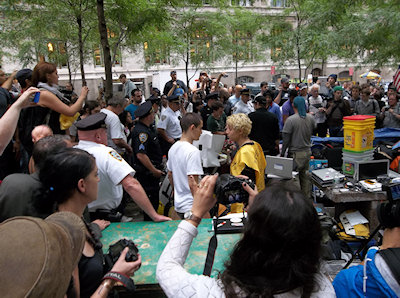
The discussion is about whether or not to establish a list of goals and demands and if so what they should be. One question raised is about whether creating these lists are just buckling to pressure from the media, 'who like to reduce everything to a sound-bite'. In keeping with the process of consensus, everyone gets to speak. Support or disfavor to an idea is signaled by wiggling all five fingers up or down. If you want to block approval of something you fold your arms. In that case, you are asked to explain your opposition, and the group engages you in options, compromises, etc. to reach beyond the block to consensus.
During the conversation, a bearded, long-haired young man, who by appearance would fit in on any campus or there in Zuccotti Park, suddenly jumps up on a wall bordering the park and shouts "I can take you all out just like that!" and snaps his fingers, and says it all again, snap included. His voice, expression, and even his posture are menacing and the oversized pack he's carrying, which I did not notice before, takes on an ominous significance. "Just like that I can take you all out!" Snap! "Don't you get it!" Then, he hops off the wall and walks down the street.
The discussion facilitator (excuse the Orwellian phrase), another young man, cleaner cut, but no less likely to fit in as well in the same places, runs out of the park toward Broadway where most of the police are. He speaks with two policemen for a moment and they go after the backpacker.
When the facilitator returns, he recounts what had happened for the entire park, "MIC CHECK! MIC CHECK!" Then, he scolds anyone who'd seen and heard the angry young man, but took no action. 'We were threatened! There may be an innocent reason why he threatened us, but he did threaten us! If we're going to exist here we must report such things to the police. The police are here to protect us, but we have to help them to help us. We can't let things like that happen.'
Witnessing this is the first difference I notice between their rebellion and those I participated in the 1960s. Back then, cops were "pigs", so I was surprised and very impressed by this effort at a working relationship with the police. Less than an hour later I see another demonstration of this enlightened approach.
Perhaps 20 policemen — a mix of uniformed beat cops, white-shirted officers, and a few in suits — stride purposefully to the center of the park, to the media-tech station. The equipment there, for recording and uploading of news and coordinating activities, is covered with bright blue plastic tarps, because it was cloudy and the forecast called for rain.
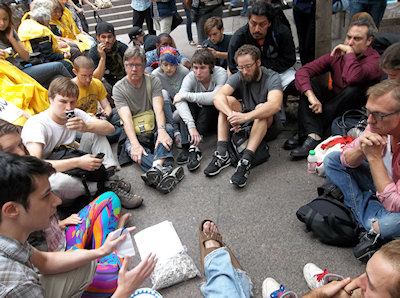
Many of us inside the park with a camera move in and surround the center — "the whole world is watching". A young woman in the media center called for a "MIC CHECK! MIC CHECK!" I thought she'd call attention to one of the white-shirted officers, who looked like Deputy Inspector Bologna, but with everyone from end to end and side to side in the park repeating her words a phrase at a time, she began a simple narration of what was happening, and from Trinity Place to Broadway, from Cedar to Liberty Streets, everyone was 'watching'.
"The police are here … The police are here … They want to see what's under the tarps … They want to see what's under the tarps." She punctuates her narration with questions and comments posed by the police and explanations provided to them, concluding with: "They say we may not cover the equipment … They say we may not cover the equipment." Those in the media station remove and begin folding the tarps, and with that the police walk out, somewhat less calculatedly than they'd come. "MIC CHECK! MIC CHECK! …" And, then the woman begins and the entire park population chants along the slogan emblazoned on police cars: "Courtesy, Professionalism, Respect … Courtesy, Professionalism, Respect …"
On the subway ride home, I cannot help comparing OWS with the anti-war movement I grew up with. Beyond the universals of protest, a few differences are striking and prepositional. We wanted out — out of the Vietnam War (which was called a mere "conflict" for much of time we protested it), out of the expectations that we were bound for corporate careers ('the future is in plastics'). The Occupiers want in — in to good, fair-paying jobs, in to a fairer tax system that requires the rich to contribute, given that most of America's wealth is created by the labor and industry of working families, who are being stripped of all they've earned.
Many of the young people I met with today seemed quick-witted and capable, and I'd guess many are college graduates who found their way to the movement because there are no jobs for them to find. Some, no doubt, dropped out, perhaps because they lack the means to attend college fulltime and had been working their way through — try doing that with an unemployment rate at or near 10%. But I shouldn't give the impression that OWS is limited to the best and brightest 20-somethings. As in any generation's demographic, there are some who seem to be exploring blind alleys, and some who need psychiatric help and, unless we develop a more compassionate health care system, will be relegated to homelessness, as if it were their choice. And there is a wide range in the ages of the people at Zuccotti, including those like me, gray-haired but still wondering and ready enough to seek and ask "What's Goin' On?"
November 2 — Happy Birthday
Since my last visit, The New York Times had reported on the Occupation only a few times.
More than being about the movement, the articles focused on the reactions of local residents and workers in the area. The articles highlighted quotes from a few residents who wanted OWS out, despite a noting a vote of approval from the community board and a survey that showed over 70% of residents supported OWS and wanted them to stay. They merely wanted them to not play drums all night. The article also cited residents reporting of filth and stench and people openly urinating and defecating in the park and in the street. This seemed unlikely if the police presence I had seen was still there, but whether I believed this or not it did raise the question: where were they going to the bathroom? Mayor Mike was still standing tall for the First Amendment while at the same time talking about a compromise, to placate residents and Wall Street's elite, as if free expression were only a right if everyone agreed to let you have it. As a potential foreshadow of an excuse to remove OWS from Zuccotti, the mayor said he was concerned about their health and safety as winter came on. It seemed like it was again time to go see for myself, so when my wife asked what I wanted for my birthday I suggested a day at Zuccotti. Taking an old winter coat no one had worn in years as a donation, we set out.
The change is shocking: most of the park is now covered in tents. But contrary to The Times reporting the park is cleaner and more organized than my desk — (my wife's comment). Given the number of people now residing in Zuccotti, the organization was striking as one walked the clearly designated lanes between tents and stations. Even with the amount of visitor traffic it is more manageable than on Manhattan streets with a car.
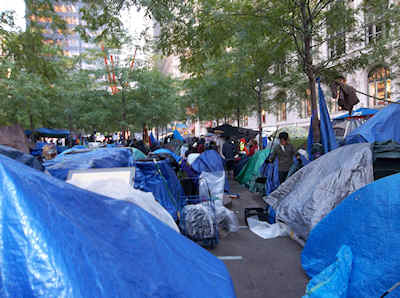
There are many more stations, now, too, and signs to designate their location. We come upon a large chalk board listing the day's schedule of General Assembly (GA) and other meetings, marches, classes and news. I ask the woman updating the board if I can take her picture. She agrees and tells us we can also check each day's schedule online at occupywallstreet.org, as well as find news and live video feeds of events. Some media equipment was now located indoors, but there was a station from which a newspaper, The Occupied Wall Street Journal operates a sort of correspondent's desk. Aside from the paper, there is much literature available in the form of flyers and position statements. The food station serves food cooked on the premises (does that qualify it as 'home cooking'?). The food is for sale to visitors, as well as to feed the Occupiers. The medical station would be the envy of any firebase military medic. There is also an extensive library, featuring genre fictions and all manor of nonfiction, heavy on the philosophy and poli sci. One station features racks of clothes, and was glad to take our coat. They were also interested in donations of sleeping bags, blankets, gloves and hats, etc.
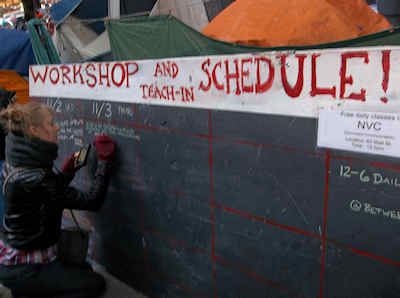
There is much evidence of support from unions and labor in general. A "Liberty Tree" sports helmets from various supporting unions and word is that the workers a few blocks away at the towers have offered occupiers the use of their port-a-sans, which were open 24/7 and there is security there, too. It is even said that they have added units to accommodate the Occupiers. Speaking to someone at the news station, we learn that OWS and unions are coordinating major rallies together — union, occupation … you might say they are made for each other. As a retired teacher, I am eager to find out if UFT is supporting OWS. There are also many pro-labor signs (Stop The War on Workers), tee-shirts (Free The Wage Slaves) and 99% buttons for sale.
This alliance with labor is another sharp contrast to the anti-Vietnam war marches of my time, where we used the term "hardhat" as an insult and they booed, threatened or beat us, and sometimes threw bricks when we passed construction sites. The thought of a rebellion that could ally with labor and keep a working relation with the police inspired hope.
Of course, with more people and 'stuff' in Zuccotti, the police presence was also greater. They were loosely wrapped around the park, with the greatest concentration across Church Street from a Bank of America and an ominous looking black tower, and across Liberty Street from Brooks Brothers. You could read this as a symbol of who they were there to protect, but my wife thought they were friendly and helpful, the way they are at a parade or street fair, giving directions and generally pleasant. Though I don't see them as that benign or neutral, they do seem more than anything else to be there to keep the peace, and we walk away feeling as gruntled as seasoned cynics ever expect to be, especially when we couple this morning's experience with news in recent days that occupations are springing up in many major cities across America as well as in Europe. It feels like a good day to be born.
November 15, Re-Occupy Zuccotti
I was sleeping when the NYPD began evicting Occupiers from Zuccotti, but my wife woke me with the news. I turned on the TV and radio, but none of the news sources I checked had many details because reporters were penned in blocks away from the park. The skimpy details were that the police gave Occupiers less than one hour notice to vacate, that they then used force, excessive by some accounts, and that they made hundreds of arrests. If I had grown up with computers I would have gone immediately to the internet, the OWS site I'd learned about a few days earlier.
But still half asleep, none of this occurred to me. Nor did I think to check my e-mail, which would have reminded me that I'd signed up to be a sort of first responder, because OWS had been expecting this and had asked for volunteers who would come on a moment's notice so there would be lots of witnesses — "The whole world is watching."
In the morning, we heard that lawyers representing OWS had filed suit against the city, charging that the police action violated the Occupiers First Amendment rights. Could those rights be enforced in Zuccotti, which was a privately-owned public space? The answer was Yes! In fact, while publically-owned spaces like a park can establish a curfew, privately-owned public spaces had to be open 24/7. The judge ordered the city to readmit the Occupiers, tents, supplies, pets, and all, immediately. Bloomberg counter-filed, asking for "clarification", so the re-entry was being held up with the police and Occupiers nose-to-nose outside the park. We set out to see what was going to happen.
At first, we cannot get to Zuccotti because the crowds are so thick, Occupiers and 'civilian' pedestrians trying to go about their business. The amount of police is shocking: a dense mix of riot and regularly uniformed police, as well as many police cars and vans, surrounding the Occupiers who are surrounding the park. Another wall of police stand between the Occupiers and the park. Inside the park there are more police as well as private security guards presumably supplied by Brookfield Office Properties, the owners of Zuccotti. Three helicopters hover high above the buildings. The tension is as thick and as the crowd and the chanting "LET US IN! LET US IN!"
Finally, we come to a relatively open space the police have cleared for pedestrian traffic along Trinity Place. "Keep moving! Keep moving," a policeman says, as he moves in spreading his arms out in a herding gesture. We're sandwiched in between police and fencing. All around the park, there is barrier-fencing, each segment fastened to the next by plastic handcuffs. There are just two points of access, and there are police stationed outside and security guards inside. One access is on Liberty Street, the other on Cedar Street. There is an additional barrier-fence, also lined by police, between the sidewalks and the streets.
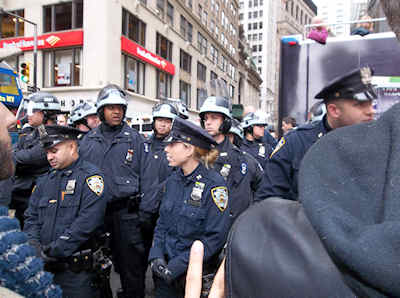
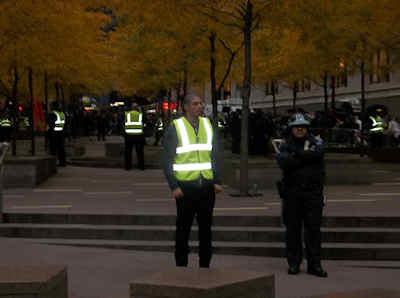
Before we're shooed away, we notice a red-haired woman walk up to the park barrier and take a picture of the police there and the park behind them thick with private security guards . Suddenly, four helmeted riot police pen her in between their bodies and the fence. A white-shirted officer just inside the park stands watching impassively. Immediately, the street fills with Occupiers rushing in with their cameras, chanting "The Whole World Is Watching!" Police along both fences move in to clear the area. Everyone is peaceful, civil, slowly, carefully defiant. The police want us to move faster, but seem resolved to not actually push as long as we're moving. A few Occupiers resist, one carrying a laptop with microphone and camera attachment — I think we're on a live feed, I say. How's my hair, my wife asks. We're moved along, but the crowd is so dense we're just shuffling, heel-and-toe. On the fringe we see someone taken off by the police, but we can't move in that direction. We can't see the woman anymore, either.
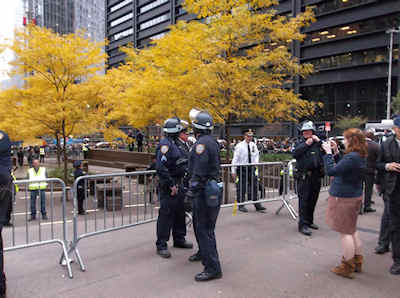
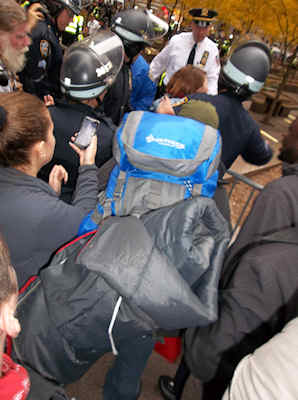
It takes almost an hour just to circle the block. Everyone here, demonstrators and police alike, is waiting for news from the court. I don't think the police care what the decision is, just so it comes and they can either take action or stand down. Minor skirmishes are becoming a part of the tenor of the day and "LET US IN! LET US IN!" is becoming our pulse and heartbeat. After another hour, someone calls for a "MIC CHECK! MIC CHECK!" and delivered by hundreds of voices from every corner of the unoccupied park we hear that the judge is expected to rule any minute. It's about three o'clock and we're cold and hungry, so we go to Steve's Pizza, across Trinity Place from the park.
Three cops walk in, the visors on their riot helmets are up. They consume more horizontal and vertical space than we do. Consider what they are wearing: waffle-padded, Kevlar-enhanced bulletproof vests under their shirts; their hips belts are burdened by a square-handled 45-caliber, semi-automatic pistol in a holster, bullets in individual sleeves, a digital walkie-talkie, a 51/2X11, leather-bound notepad, and gloves; their trouser straps securing perhaps a dozen white-plastic cuffs; and then there's their visor-up helmets, not to mention some hidden gear, like a small, finger-operated pepper spray containers. But it is clear that they are here for the same thing we were, a slice, coffee, a break, and a chance to warm up; respecting everyone's constitutional right to eat in peace, we do not speak to each other. Are they thinking about how later they might have to pepper spray, "baton" or cuff us? We are. "Please, pass the oregano."
After lunch, we walk right into a standoff. Cedar Street is choked with Occupiers, so vehicle traffic is detoured, and has been all day. Now, the police decide they are going to open Cedar to vehicles, so they make a bullhorn announcement. But there isn't enough room on the sidewalks to accommodate all the Occupiers waiting to be readmitted to the park. The police already moved us off Trinity Place and Broadway to clear the way for pedestrian traffic and it does not look like they are willing to give back that ground, so it looks as if push is about to come to shove. The police are violating the judge's order to let the Occupiers back in. Keeping us out while Bloomberg has the decision explained to him is the mayor's idea (of harassment?), and the police are enforcing it.
We are given 15 minutes to clear the street, and in that time additional riot police arrive and form a line stretching all along Trinity Place, from Liberty to Cedar, with extra rows facing us, as they wait for the order to move us. Many people move away, down toward Broadway or cross to stand on Cedar's other sidewalk, where news teams are kept at bay. We can see the silhouettes of office workers in the black-glass tower looking down on the scene. One helicopter re-stations itself above us.
I served in the Vietnam with 3rd Marines, the police in front of me look to be in a rifle squad configuration, everything in place to cordon and assault. Perhaps it's the same maneuver they employed to evict the Occupiers last night, while I was safe and warm in my bed. My wife and I had decided, when we saw the crowds this morning and sensed the tension, that our roles would be to provide our peaceful presence, no 'storming the barricades' at our age. But everything shifts so rapidly at gatherings like these, and here we were toe-to-toe with a long line of riot police.
A police force is, after all, a professional militia. I try to talk to one young officer through his visor, because he is so nervous he makes me nervous. If the order to move us comes, I don't want to be his target, so I talk calmly to calm him. I do not believe that he or any of the police here today joined the force to do this. But that is what they are here to do today, and like all soldiers they will follow their orders and carry out the assigned mission. And we peaceful soldiers have come with our mission, too, so we stand facing the police across the frayed threshold where those missions conflict, and that is where the battle will be engaged.
This tension is broken, however, by one of OWS's legal reps who shares some papers and conversation with one of the white-shirted officers, then in a "MIC CHECK! MIC CHECK!" hundreds of voices deliver the words that a judge has ordered the city to let the Occupiers back into the park "without further delay! … without further delay!" However, the ruling also offers a partial victory for the mayor, and no tents, no "large" backpacks, no pets, and no lying down will be permitted in the park.
For the moment, justice, fleeting and imperfect though it may be, has prevailed and there is cheering and a grand sense of victory. Slowly, the phalanxes of Occupiers re-enter the park; many of them had marched much of the night after being evicted and then waited all day for this moment. It is their victory on behalf of The 99%, on behalf of We The People, and it feels good to occupy that moment. But it is also apparent, in that good moment, that the security guards will remain inside the park, and the police inside and outside will remain as well, and the encircling barricades are not going to be taken down. The word Occupy has changed, taken on a regrettable complexity.
As we re-enter the park a policeman says to me, "Okay, you get it back today and tomorrow we take it again." He's probably right — in every war there are many battles, and this is just one.
Standing in the park, the streetlights beginning to glow through the city dusk gathering between the towers, and I'm surrounded by joy and celebration. Trying to savor this as a victory, I recall the final stanza of James Dickey's poem "The Heaven of Animals":
At the cycle's center,
They tremble, they walk
Under the tree,
They fall, they are torn,
They rise, they walk again.
We, of course, are not those animals. Those animals would never do such beastly things to each other.
November 18, 18 Mayors — What Me Worry?
It's November 18, and using some of the technology that fueled the Arab Spring and drives the Occupy movement I'm going to cyber-Zuccotti. Actually, since the movement is now said to be occupying some 30 American cities, as well as some in Canada, Europe, and Australia, there's no telling where I may go.
Disturbing news out of California directs me there, first. I'm watching a YouTube video of a group of students sitting in a peaceful line as campus policeman at UC Davis approach and pepper spray them: http://www.youtube.com/watch?v=6AdDLhPwpp4. They do not get up, they sit in perfect civil disobedience. It is strange to think that while the use of pepper spray is prohibited in war, according to the 1993 Chemical Weapons Warfare Convention, it may be used legally to disperse nonviolent protestors.
More searching reveals that this SC Davis attack on Occupiers is one in a series of brutal crackdowns that began in Oakland. In a BBC interview, Oakland Mayor Jean Quan admitted that the violent police actions she ordered — including the use of rubber bullets — to remove Occupy from her city are part of a coordinated nationwide effort to end the movement. Five minutes into audio link below, she explains that she and mayors in 18 major cities held a conference call to plan the crackdown: http://www.thetakeaway.org/2011/nov/15/after-ouster-occupy-oakland-protesters-return/. Is this some perverse version of "MIKE CHECK! MIC CHECK!" wherein a police assault in one city is repeated by another and another until occupations from "the New York Island to the Gulf Stream waters" feel the wrath of the 1%?
And who, Ms Quan, initiated that call and drew up the blueprint for the coordinated attacks? I search, but only find suggestion and supposition, all leading to either the U.S. Justice Department or Homeland Security, but none are confirmed. And where is our president in a time of such upheaval? He's gone to Australia, where cities are also being occupied.
I check The New York Times today and its recent archives, and there is hardly anything about the OWS movement. I'm not surprised, since their coverage of the wars we're fighting has been spare at best; and these wars cost $2 billion a week. And yet, their coverage of pro-democracy actions around the world is thorough and insightful.
Last month, I wrote a Letter to the Editor at The Times. I said I was cancelling my subscription, because I could never find anything about Occupation events or their evolution into an international pro-democracy force. I was surprised not a week later to receive a letter from Senior Editor Greg Brock. He regretted my cancellation, but said he could not agree with my assessment of the Times' coverage. To prove his point he sent me a link to ten articles that he said reported on OWS. Half of them reported on what other people thought of the movement, none of the ten appeared on the front page, and most were single-column piece buried in the paper with no reference to it from either listings of contents.
That Sunday, in the newly designed Sunday Review section — a sad compilation of opinion and pr pieces in lieu of the great in-depth reporting, commentary and debate that used to occupy that space under the banner The Week in Review — there was a piece about the number of readers who'd written to complain about the paper's failing coverage of Occupy. It went on to describe a conference table discussion about how they could better cover the movement. This seemed more pathetic than the lack of coverage: the staff of the once 'paper of record' conducting a journalism 101 how-to workshop. I would direct them to read some of the excellent reporting and analysis they have recently done in covering protests in Egypt and Syria, for starters. Despite a letter and response the question still nags at me: why doesn't The New York Times cover what is arguably the most vigorous and far-reaching political action in our nation since the civil rights movement? Where can I find the answer to that one online?
November 21, Let The Whole World Watch, But Don't Let Them Listen!
Back in Zuccotti in real time and space. Again, the changes are immediate and shocking. The layers of police and security guards and fencing remain remarkably unchanged. There are fewer than a hundred people inside, though several discussions are in progress. What jumps at you is the behavior of the police. Though they are in the same places, perhaps literally, their focus does not seem to be in restricting the Occupiers — that, in appearance at least, is already accomplished — their focus now seems to be to restrict contact between the Occupiers and civilians. This they are accomplishing by not allowing any passersby outside Zuccotti to stop and listen or take part in discussions, or watch and wonder 'What's Goin' On?'
Example one: I'm in a discussion group about why 'we' don't designate leaders. The discussion follows the same open, consensus-seeking style I'd witnessed on previous visits. Our group 'occupies' a few benches near the barrier-fencing along Cedar Street. As soon as two or more people stop by the fence and look in, police move in and move them along. One elderly gentleman asks why and is told he's blocking the path of other pedestrians. He looks around and sees there is plenty of room and there are not more than one or two people walking in either direction. Nonetheless, he moves along with a disgusted wave of his hand.
When a veteran in uniform stops and ignores a policeman that urges him to move, two more police come over to assist. The vet's attention is focused on our discussion, and this time the police don't move away but stop trying to move him; they just stand there with him. Perhaps they are shying from getting into an incident like the ones involving vets in Oakland, where a recently returned Iraq vet suffered a cracked skull after being hit by a police-launched teargas canister (he may have lasting brain damage as a result), and in Berkley, where another returning vet was beaten so severely by a group "baton" wielding police his spleen was ruptured).
This is a good place to recall Orwell's lesson about 'politics and the English language'. Baton! Conductors use batons, and even the fiery Toscanini in his most enraged moments could not rupture the spleen of a flat oboist with a baton, though he might have wanted to. The only thing being orchestrated with these "batons" is violence and the disconnection of readers from reality: they are clubs, cudgels, bludgeons, shillelaghs, nightsticks, bats, truncheons, etc., and they're designed to crack skulls and rupture spleens!
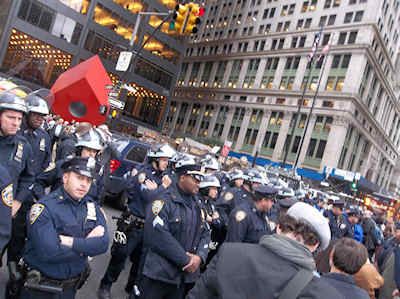
Example two: One of two women walking a dog stops and asks what we're talking about. The facilitator (there's that word, again) gives her the boilerplate treatise on inequality as seen through the lens of the 99% v 1%, when the police move in to move them on. "Please keep walking your dog, ma'am." "Don't be silly, I live around the corner." "Please keep walking your dog, ma'am." "I can't talk stand here and talk to them?" "Please curb your dog." The other woman, looking more concerned than annoyed takes the dog walker's arm and they move on.
Example three: A young woman stops and listens to our discussion and offers a comment. Before she can finish police move in to move her on. But she is urged to come in by the facilitator. She goes to the nearest 'checkpoint' entry but is denied access because of her pack. She asks if they (police or security guards who are there anyway) can watch it for her: No. She asks is there an area she store it: No. Then, she demands to be allowed in or to stand along the fence to exercise her right to assembly and free speech: No. She has to move. She refuses and two police grab her arms. At this point a marshal — I believe OWS now trains and positions these marshals where they can spot and defuse such situations before they escalate — and a security guard arrive and speak with the police and the woman. She and the police disentangle and cool down, and she walks away. Later, I hear of other meetings at nearby sites, some indoors. Perhaps the marshall directed her to one of those.
This suppression of discourse is particularly distressing when I think of the lack of coverage in the media. How many trees fell in the forest today? Can a global people's movement involving hundreds of thousands go unnoticed except by its participants and bystander witnesses? Answer the second question first.
Today's good news comes from the second discussion group I attend. OWS can say they're leaderless as much as they want, and I think it's smart — why set up targets for those who you know are looking to cut you down, it's a tried and true street and military tactic, cut off the head (leader) and the body becomes powerless. But make no mistake, two minutes in any one of these meetings and you see at the center people who are well trained in organizing, and smart and fast-thinking enough to conduct a discussion with a clear focus that moves toward consensus, and do this with an inner group of regulars but also literally anyone who shows up and wants to participate; they and the meetings are very impressive. Out of these meetings comes the bottom up energy and ideas to create something like last Thursday's National Day of Action, featuring different events throughout the day in cities around the world.
The discussion I'm in is about beginning to occupy foreclosed houses and putting families back in them (http://occupywallst.org/article/occupy-walleet-goes-home/). Some of the speakers have been working on site selection, here in New York and many other cities. There is unanimity on the plan, but some sticking points on how to implement it: should they occupy houses foreclosed on by banks with the most abusive practices; should they try to reinstate the family that lost each house. These are good, democratic questions and problems to pose and solve, and wherever consensus leads them I'd say look for the Occupy to come in from the cold this winter, along with many families foreclosed out of their homes … a good note to end on.
Witness has always played a role in forcing or speeding social change, but what constitutes the act of witness, publishing (Levi, Dickens, Shaw, Ahkmatova, Tolstoy, Steinbeck), writing to legislators or editors, signing petitions, speaking at public hearings and town hall meetings, joining political or activist clubs, speaking to a neighbor? I started this with a phrase borrowed Marvin Gaye's song "What's Goin' On?", and though I'm twisting his meaning with this next one, I close with another of his titles: "Can I get a Witness?"
FYI: In a November meeting of some 40 OWS planners, activist, author, movie-maker Michael Moore offered the following Top 10 List.
10 Things We Want
A Proposal for Occupy Wall Street
Submitted by Michael Moore
1. Eradicate the Bush tax cuts for the rich and institute new taxes on the wealthiest Americans and on corporations, including a tax on all trading on Wall Street (where they currently pay 0%).
2. Assess a penalty tax on any corporation that moves American jobs to other countries when that company is already making profits in America. Our jobs are the most important national treasure and they cannot be removed from the country simply because someone wants to make more money.
3. Require that all Americans pay the same Social Security tax on all of their earnings (normally, the middle class pays about 6% of their income to Social Security; someone making $1 million a year pays about 0.6% (or 90% less than the average person). This law would simply make the rich pay what everyone else pays.
4. Reinstate the Glass-Steagall Act, placing serious regulations on how business is conducted by Wall Street and the banks.
5. Investigate the Crash of 2008, and bring to justice those who committed any crimes.
6. Reorder our nation's spending priorities (including the ending of all foreign wars and their cost of over $2 billion a week). This will re-open libraries, reinstate band and art and civics classes in our schools, fix our roads and bridges and infrastructure, wire the entire country for 21st century internet, and support scientific research that improves our lives.
7. Join the rest of the free world and create a single-payer, free and universal health care system that covers all Americans all of the time.
8. Immediately reduce carbon emissions that are destroying the planet and discover ways to live without the oil that will be depleted and gone by the end of this century.
9. Require corporations with more than 10,000 employees to restructure their board of directors so that 50% of its members are elected by the company's workers. We can never have a real democracy as long as most people have no say in what happens at the place they spend most of their time: their job. (For any U.S. businesspeople freaking out at this idea because you think workers can't run a successful company: Germany has a law like this and it has helped to make Germany the world's leading manufacturing exporter.)
10. We, the people, must pass three constitutional amendments that will go a long way toward fixing the core problems we now have. These include:
a) A constitutional amendment that fixes our broken electoral system by 1) completely removing campaign contributions from the political process; 2) requiring all elections to be publicly financed; 3) moving election day to the weekend to increase voter turnout; 4) making all Americans registered voters at the moment of their birth; 5) banning computerized voting and requiring that all elections take place on paper ballots.
b) A constitutional amendment declaring that corporations are not people and do not have the constitutional rights of citizens. This amendment should also state that the interests of the general public and society must always come before the interests of corporations.
c) A constitutional amendment that will act as a "second bill of rights" as proposed by President Frankin D. Roosevelt: that every American has a human right to employment, to health care, to a free and full education, to breathe clean air, drink clean water and eat safe food, and to be cared for with dignity and respect in their old age.
Richard Levine is the author of That Country's Soul, A Language Full of Wars and Songs, Snapshots from a Battle, and forthcoming from Bright Hill Press A Tide of a Hundred Mountains (2012). His poem "Believe This" was featured in former Poet Laureate Ted Kooser's column, "American Life in Poetry". In 2010, Mr. Levine was runner-up for the 2010 William Stafford Award for Poetry. A retired teacher, he is learning to steward a forest.